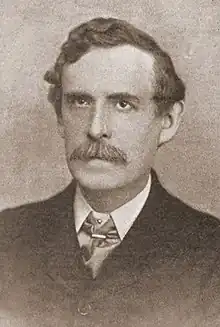Herbert Burrows
Herbert Burrows (12 June 1845 – 14 December 1922) was a British socialist activist.[1]
Herbert Burrows | |
|---|---|
 | |
| Born | 12 June 1845 Redgrave, Suffolk, England |
| Died | 14 December 1922 Highbury Park, London, England |
| Occupation | Socialist organiser |
| Organization(s) | Manhood Suffrage League; National Secular Society; The Rainbow Circle; Conway Hall Ethical Society; Theosophical Society |
| Political party | Social Democratic Federation |
| Movement | Socialism; trade unionism; secularism; theosophy |
| Spouse | Mary Hannah (m. 1869) |
| Parent |
|
Early life
Born in Redgrave, Suffolk, Burrows' father Amos was a former Chartist leader.[1] Burrows educated himself using Cassell's shilling handbooks, becoming a pupil teacher at the age of thirteen; he initially pursued a career in teaching before becoming an excise officer.[2] In 1869, he married Mary Hannah Musk (1845–1889).[1] The couple had a daughter and a son.[1]
From 1872, Burrows studied briefly as a non-collegiate student at the University of Cambridge, but did not take a degree.[1][2] He worked as a civil servant for the Inland Revenue,[2] including in Norwich, Barnet, Blackburn, and Chatham,[1] a career that lasted until his retirement in 1907.[2]
Activism
Burrows moved to London in 1877, where he joined radical clubs including the National Secular Society.[1][2] He was a founder member of the Aristotelian Society in 1880, joined the Social and Political Education League and became Vice President of the Manhood Suffrage League.[1] In 1881, with Henry Hyndman, he formed the Democratic Federation, and became its treasurer in 1883.[1]
Burrows supported the Federation's commitment to socialism in 1884, when it was renamed the Social Democratic Federation (SDF).[1] Often writing under the pseudonym C.V., he contributed articles to its newspaper, Justice.[1] He represented the group on the executive of the Law and Liberty League.[1]
With Annie Besant—whom he had met through his connection with Bradlaugh and the National Secular Society—Burrows was a key organiser of the Bryant & May matchgirls' strike of 1888,[2] and afterwards became the treasurer of the Union of Women Matchmakers, then the largest women's trade union in England.[1] Burrows actively promoted unionisation among workers, and the success of the matchgirls' strike helped to galvanise the trade union movement.[1] He maintained an active role in the Women's Trade Union League and the Women's Industrial Council until 1917.[1]
Burrows also became a prominent member of South Place Ethical Society,[2] the Rainbow Circle,[3] the Theosophical Society, the International Arbitration and Peace Association and the International Arbitration League.[1] From 1907 until 1922, Burrows was Appointed Lecturer to the South Place Ethical Society, now Conway Hall Ethical Society.[4] He was a teetotaller, vegetarian, and lifelong pacifist.[1]
Burrows stood for Parliament unsuccessfully in the 1908 Haggerston by-election,[5] and again in Haggerston in 1910.[1] He resigned from the SDF (then the Social Democratic Party) in 1911.[1]
Death
Afflicted by paralysis from 1917, Burrows died at his home in Highbury Park, London on 14 December 1922.[1]
References
- "Burrows, Herbert (1845–1922), socialist organizer". Oxford Dictionary of National Biography (online ed.). Oxford University Press. 8 October 2009. doi:10.1093/ref:odnb/39607. Retrieved 4 December 2022. (Subscription or UK public library membership required.)
- MacKillop, Ian D. (1986). The British Ethical Societies. Cambridge University Press. pp. 60–62. ISBN 978-0-521-26672-7.
- Freeden, Michael, ed. (1989). Minutes of the Rainbow Circle, 1894–1924. Offices of the Royal Historical Society, University College. pp. ix, 40, 90. ISBN 978-0-86193-120-0.
- "Galleries". Conway Hall. Archived from the original on 2 May 2019. Retrieved 7 January 2020.
- "The polling in the Haggerston division of Shoreditch took place..." The Spectator Archive. 8 August 1908. p. 2. Retrieved 2 January 2023.